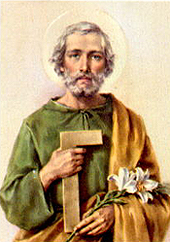Dwight Longenecker's Blog, page 296
March 20, 2012
The Vicar and the ABC
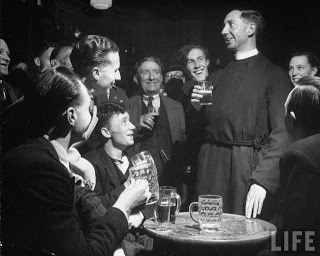
Guest blogger, The Rev'd Humphrey Blytherington is Vicar of St Hilda's, Little Snoring with All Saints, Great Snoring. He is a graduate of Plymouth University. He completed his studies for the ministry at Latimer Hall, Durham. He is married to Daphne and enjoys home brewing, model railroading and is an avid member of the Great Snoring Morris Dancers.
Evenin' all! Sorry not to have been down here at the pub for so long, but She Who Must Be Obeyed insisted on a holiday together. Now she's a Roman she wants to visit France and Italy all the time, so we spent the two weeks trolling through Normandy. Very enjoyable indeed.
Daphne dragged me off to visit Lisieux where some little gal lived who the Romans think is awfully special. Daff was thrilled, but I couldn't quite see it myself. They say she's a great saint, but seems to me she was a rather spoiled child who said a rosary bead every time she climbed the stairs and then became a nun. It's all the sentimental stuff the Romans are worst at I'm afraid--all simpering sisters, roses and holy cards. Not really my cup of tea at all.
What did I like about it all? Well, to tell the truth, the little restaurants were awfully good and we stopped by that French version of St Michael's Mount. Can't help being impressed by that--monastery built on a rock in the middle of the bay. There was a rather odd thing happened at that Lisieux place too. Daff was in the chapel of the convent praying and I was sitting on a bench enjoying the afternoon sun when suddenly the most extraordinary thing... a slight breeze and I could swear I heard someone whispering, "I pray for priests I will pray for you." It kept up for about a minute or so, then it all died down. I expect it was just the combination of the breeze in the trees and the rather good lunch I'd just had. P'raps I dozed off a bit and dreamed the whole thing. It's odd how the mind plays tricks on one.
Well lads, it looks like we're going to get a new Archbishop of Canterbury. Y'know I bumped into the present fellow once at a diocesan do. Seemed pleasant enough. Needs a good barber in my opinion, but he seems to enjoy the 'beardy weirdie' reputation. Folks have been saying that he's been a terrible Archbishop, but I can't see it myself. Seems to me he's done just a good a job as anybody else. Everybody tut tutting about it being an impossible job. Doesn't seem so tricky to me. All it takes is keeping one's mouth shut and pretty much letting everybody get on with doing as they like. Now and then you might have to remind folks to be a bit more tolerant, but that's all. Seems a doddle. No problem at all.
What it takes is understanding the dear old C of E. We're a broad church. There's room for everyone here. Lavinia was saying the other day that Our Lord wouldn't have excluded anyone, and didn't he say to the woman taken in adultery, "neither do I condemn you?"
I did meet that George Carey a couple of times. He was a jolly enough fellow, not all that bright, but you don't need brains to be a nice chap. It was Mrs Carey who was rather formidable. Eileen she was called. A rather hefty woman as I remember. We were at a garden party at Lambeth Palace. An old college friend of mine was being made bishop and Daphne and I found ourselves in conversation with Mrs Carey. Daphne said she wasn't in favor of women's ordination and Eileen got really rather huffy. Said something like, "You'd better go off and join the Romans then. The sooner people like you leave the Church of England the better."
I was trying to smooth her feathers, but I could see poor old Daff was most annoyed. She sipped her tea and said, "Mrs Carey, you must know all the wives of the bishops. Have you ever met Mrs. Proudie? You remind me so much of her." Mrs. Carey said she had never met Bishop Proudie and asked what diocese he was. "Barchester" said Daff. Eileen got a sort of befuddled look then changed the subject.
It took a week for poor old Daff to cool off. Never mind. Water under the bridge. We'll all be looking forward to the next fellow to take the job. Some folks think it could be that African. I like him. That should liven things up in Canterbury. Bongo drums and dancing in the aisles I expect. Sounds like good fun don't you think?
Catholicism and Free Thought
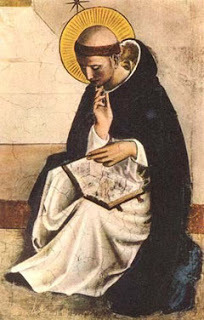
One of the favorite bats the anti-Catholics like to hit us with is the idea that Catholicism, because it is a dogmatic religion–must therefore stifle free thought and free speech.
"How nice for you" the condescending Anglican will say to the convert, "Now you're a Catholic you won't have to think anymore." Or, "It must be nice to be a Catholic and have such 'certainty.'" This is said with a snuffling, cynical laugh because by 'certainty' they mean that you have become a mindless moron–a Kool Aid drinking cult member following the demands of your leader in white without thinking.
Another jab is, "Of course there are some folks who need that kind of certainty." The subtext here is, "You're not really smart enough to think things through yourself, and you are probably emotionally and socially insecure and immature so you need to belong to a mutual self love group which offers it's members certainty in all things."
Like every heresy this is partially true. There certainly are cults that offer their members mind numbing 'certainty'. There are emotionally insecure and immature people who need to belong to such cults. We have to admit that there are some Catholics like that, and there are sadly, some Catholic sub-groups–religious orders and religious communities and movements in which members have sometimes behaved like this.
However, abuses do not undo right uses. The greatest response I know to the charge that "You Catholics all thoughtlessly follow your leader, believing and doing whatever he tells you" is that "You clearly don't know very many Catholics. The vast majority take little notice of what their leader tells them and have scant understanding of either the dogmas or the moral teaching of their church."
But that is to make a cynical response. Instead there is a more reasoned argument, and it is this: Let us ask foundational questions. Either there is such a thing as truth or there is not. If there is no such a thing as truth, then every man may think what he likes and the world is absurd. If there is such a thing as truth, then because we are creatures who use language both in thought and speech, then we must be able to put that truth into words.
We put that truth into words in many different ways. We tell stories, we write poems, we discuss and debate and reason our way into truth, and one of the ways we express the truth is through propositional theological statements. These statements or resolutions are not the whole truth, but they state the truth in a propositional way as precisely and completely as is possible. This statement of truth we call dogma.
If this process is possible at all, then a church (which is founded to proclaim and live the truth) must in some sense be dogmatic, and if it is at all dogmatic, then it must be in the business, at least in a minimal sense, to declare that dogma to be necessary. If the dogma wasn't necessary, then it wouldn't be dogma. In other words, that church must have the authority to say, "This particular proposition is true. That means you must believe it if you belong to this church because the church lives to proclaim and live the truth. It can't be true sometimes and not at other times. It can't be true for me and not for you. If it is true, then it is true always and everywhere for all people whether they understand it or not.
Now this is something solid–something real. It is a rock on which to build. Without such a thing as dogma (and the authority to declare a belief a dogma) the church is built on shifting sand of subjective personal opinion. This rock on which to build does not suppress free thought. It may seem to suppress free thought because, by virtue of declaring some things true it must necessarily declare other things to be false. To say, "My apple is red"is also to say "My apple is not blue."
Totally 'free thought' is like playing tennis without a net. Totally 'free thought' is free, but it is not thought–it is an expression of opinion or an exclamation of emotion. Dogma, therefore, empowers free thought. It does not suppress it. This is because dogma provides the fixed point upon which free thought can be based. Dogma is demanded not because it gives all the answers, but because it gives the foundation upon which to ask the right questions. Dogma gives thought wings because it gives thought a structure.
Even when a person dissents from church teaching and denies the dogma they are still affirming the necessity for dogma, otherwise what would they have to rebel against? Even the person who kicks a rock proves that the rock exists. Indeed, it is arguable that it is the person who kicks the rock who is most affected by the rock, for by kicking the rock they have hurt their foot. Therefore even the 'free thinker' who rejects dogma proves the reality and solidity of that dogma.
Therefore dogma gives thought structure. It not only gives thought a structure, but dogma, combined with tradition, give a person a context and structure for a unified world view. There are corridors in the mind, shelves of knowledge which are catalogued, galleries of works of art to enlighten and libraries of the great minds from the past to illuminate, biographies of the wise and righteous to guide and correct the free thought. Catholicism, rooted and nurtured and flourishing within the Western classical tradition provides a unique and irreplaceable structure in which truly free thought can flourish.
Without this structure and context the 'free thought' is simply a jumble of impressions and emotional reactions conditioned by a scrap of propaganda here, a bit of education there and a swirl of sentimental reactions and personal opinions thrown up by popular culture and conditioned by a shallow educational experience.
Dogma provides that structure necessary for real thought. If we take the creed as an example, some free thinkers may find it restrictive–an antique formula for a dying religion. It is a straight jacket, a set of blinders, a cage for the mind. Think rather that it is a ladder on which to climb. It is the stairway on which to ascend, it is the map for the journey.
But it is the climbing, the ascent and the journey which matters most.
Sentimentalism and Violence
When dogmatic belief dies all that is left is subjectivism, and when subjective belief (which is never more than mere opinion) dies all that is left is sentimentalism.
Our society now is awash in sentimentalism. Most every argument is now a sentimental (or utilitarian) argument. Here is an example: Slaughterhouses kill animals so we can eat them. Vegetarians feel bad about this. Not only do they want to not eat meat themselves, but they don't want us to eat meat either.
Most of them have no philosophical or logical reasons for banning meat. They might have moral arguments–that factory farming and slaughterhouse practice is un necessarily cruel and barbaric–but mostly their argument is sentimental. Killing animals makes them feel bad.
Sentimentality lead to violence when sentimentality becomes an ideology. An ideology is a single driving idea that sweeps every other consideration aside. Those who follow an ideology are always self righteous, and they will use every means possible to enforce their ideology. The ideologue may attempt to argue logically or philosophically, but this will only be a tactic–it is not because he believes that logic, philosophy or theology have any real weight. These disciplines will serve the ideology–the ideology itself may never be questioned. Not only logic and philosophy are subject to the ideology, but all things are subject to the ideology. All other considerations are subject to his ideology–including moral considerations.
So the sentimental ideologue will eventually force his opponent to conform. He will use any means possible–political legislation, financial pressure, social pressure, shouting more loudly, imprisonment and persecution and finally bloodshed if necessary.
This is why the Catholic faith is the sworn enemy of every ideology: because the Catholic faith insists that there is a higher truth, that there is an objective truth and that it is revealed by God–not made up by human beings. Every ideology–whether it is economic or political or sentimental or erotic or ecological or social–every ideology will find the Catholic Church to be an obstacle.
The ultimate irony is that every ideology (like every heresy) is partially true, and it would find it's fulfillment within the fully expounded Catholic faith.
The way, therefore to counter the ideologies is not for Catholics to be better ideologues, but for Catholics to be better Catholics.
Update: The Anchoress writes here some further thoughts on Sentimentalism. She contributed a chapter on this awful "ism" for the book Disorientation.
The Vicar and the ABC

Guest blogger, The Rev'd Humphrey Blytherington is Vicar of St Hilda's, Little Snoring with All Saints, Great Snoring. He is a graduate of Plymouth University. He completed his studies for the ministry at Latimer Hall, Durham. He is married to Daphne and enjoys home brewing, model railroading and is an avid member of the Great Snoring Morris Dancers.
Evenin' all! Sorry not to have been down here at the pub for so long, but She Who Must Be Obeyed insisted on a holiday together. Now she's a Roman she wants to visit France and Italy all the time, so we spent the two weeks trolling through Normandy. Very enjoyable indeed.
Daphne dragged me off to visit Lisieux where some little gal lived who the Romans think is awfully special. Daff was thrilled, but I couldn't quite see it myself. They say she's a great saint, but seems to me she was a rather spoiled child who said a rosary bead every time she climbed the stairs and then became a nun. It's all the sentimental stuff the Romans are worst at I'm afraid–all simpering sisters, roses and holy cards. Not really my cup of tea at all.
What did I like about it all? Well, to tell the truth, the little restaurants were awfully good and we stopped by that French version of St Michael's Mount. Can't help being impressed by that–monastery built on a rock in the middle of the bay. There was a rather odd thing happened at that Lisieux place too. Daff was in the chapel of the convent praying and I was sitting on a bench enjoying the afternoon sun when suddenly the most extraordinary thing… a slight breeze and I could swear I heard someone whispering, "I pray for priests I will pray for you." It kept up for about a minute or so, then it all died down. I expect it was just the combination of the breeze in the trees and the rather good lunch I'd just had. P'raps I dozed off a bit and dreamed the whole thing. It's odd how the mind plays tricks on one.
Well lads, it looks like we're going to get a new Archbishop of Canterbury. Y'know I bumped into the present fellow once at a diocesan do. Seemed pleasant enough. Needs a good barber in my opinion, but he seems to enjoy the 'beardy weirdie' reputation. Folks have been saying that he's been a terrible Archbishop, but I can't see it myself. Seems to me he's done just a good a job as anybody else. Everybody tut tutting about it being an impossible job. Doesn't seem so tricky to me. All it takes is keeping one's mouth shut and pretty much letting everybody get on with doing as they like. Now and then you might have to remind folks to be a bit more tolerant, but that's all. Seems a doddle. No problem at all.
What it takes is understanding the dear old C of E. We're a broad church. There's room for everyone here. Lavinia was saying the other day that Our Lord wouldn't have excluded anyone, and didn't he say to the woman taken in adultery, "neither do I condemn you?"
I did meet that George Carey a couple of times. He was a jolly enough fellow, not all that bright, but you don't need brains to be a nice chap. It was Mrs Carey who was rather formidable. Eileen she was called. A rather hefty woman as I remember. We were at a garden party at Lambeth Palace. An old college friend of mine was being made bishop and Daphne and I found ourselves in conversation with Mrs Carey. Daphne said she wasn't in favor of women's ordination and Eileen got really rather huffy. Said something like, "You'd better go off and join the Romans then. The sooner people like you leave the Church of England the better."
I was trying to smooth her feathers, but I could see poor old Daff was most annoyed. She sipped her tea and said, "Mrs Carey, you must know all the wives of the bishops. Have you ever met Mrs. Proudie? You remind me so much of her." Mrs. Carey said she had never met Bishop Proudie and asked what diocese he was. "Barchester" said Daff. Eileen got a sort of befuddled look then changed the subject.
It took a week for poor old Daff to cool off. Never mind. Water under the bridge. We'll all be looking forward to the next fellow to take the job. Some folks think it could be that African. I like him. That should liven things up in Canterbury. Bongo drums and dancing in the aisles I expect. Sounds like good fun don't you think?
March 19, 2012
St Joseph - The Wise Old Man
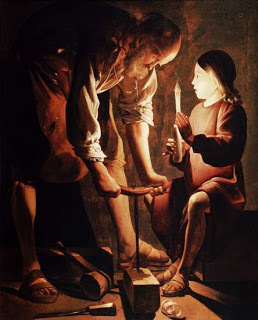
Have you ever noticed how certain characters crop up in story after story? They're called archetypes. You've got the princess, the king, the wicked queen, the witch, the soldier, the jester, the fairy godmother, the wicked sorcerer and the wise old man.
What I love about the saints is that they fulfill a kind of function in the life of the world as if they are making all the fairy stories come true. The fairy tales with their stock characters point to a greater reality, and the reality is the mystery of salvation working its way out through ordinary human history.
St Joseph, for example, is the historical foster father of Our Lord. He's a humble carpenter, a wise, strong and silent man. But in the wider scheme of the imagination he also becomes the wise old man. See how this character type comes up in story after story? Gandalf, and Obi Wan Kenobi and the Wise Wizard and Merlin. You can think of more--maybe Dumbledore. These wise old men are the mentors of the hero. They are the 'extra father.'
Within the Judeo Christian tradition they are Father Abraham, the patriarchs, Moses with his staff and old Samuel who anoints the king. They are the monks and hermits of the world--Elijah the prophet and the Apostle John--venerable and strong. They are St Antony of Egypt and St Benedict.
The wise old man is also St Joseph. He's there as a source of wisdom, chastity, charity and clarity and light. He's there as an extra grandfather and godfather and holy father in God.
St Joseph
pray for us.
St Joseph – The Wise Old Man

Have you ever noticed how certain characters crop up in story after story? They're called archetypes. You've got the princess, the king, the wicked queen, the witch, the soldier, the jester, the fairy godmother, the wicked sorcerer and the wise old man.
What I love about the saints is that they fulfill a kind of function in the life of the world as if they are making all the fairy stories come true. The fairy tales with their stock characters point to a greater reality, and the reality is the mystery of salvation working its way out through ordinary human history.
St Joseph, for example, is the historical foster father of Our Lord. He's a humble carpenter, a wise, strong and silent man. But in the wider scheme of the imagination he also becomes the wise old man. See how this character type comes up in story after story? Gandalf, and Obi Wan Kenobi and the Wise Wizard and Merlin. You can think of more–maybe Dumbledore. These wise old men are the mentors of the hero. They are the 'extra father.'
Within the Judeo Christian tradition they are Father Abraham, the patriarchs, Moses with his staff and old Samuel who anoints the king. They are the monks and hermits of the world–Elijah the prophet and the Apostle John–venerable and strong. They are St Antony of Egypt and St Benedict.
The wise old man is also St Joseph. He's there as a source of wisdom, chastity, charity and clarity and light. He's there as an extra grandfather and godfather and holy father in God.
St Joseph
pray for us.
St Joseph
March 18, 2012
Chust for Nice
St Therese -- A Steel Magnolia
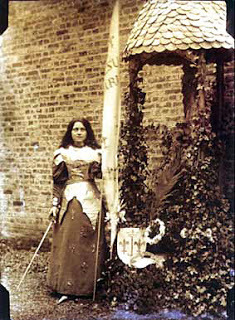
If Therese was a "Little Flower" she was a steel magnolia. Here she is pictured as one of her heroines, St Joan of Arc.
She was tough, and this post recounts her exploits in the first world war. She appeared to French soldiers and did miracles. This is a trait she shares with every saint--the awareness that she is a soldier for Christ. The same language is used by St Benedict in his rule, and examine the writings of every saint and you will find the military imagery.
I realize that it is Lent and a time of battle, but I am feeling more and more the call to be a happy warrior, and look to St Therese as a patroness. How crazily wonderful is the Catholic faith that we put forward as our most noble knight the princess--and as the most manly warrior a little girl!
For more on this saint Pius XII called 'manly' you might want my book St Benedict and St Therese--The Little Rule and the Little Way. [image error]
Un-Blessing with Un-Holy Water?
If they were really atheists they wouldn't believe any of that stuff, so why would it matter if the road were blessed or not? The fact that they take the trouble to conduct some sort of ceremony or ritual to 'un-bless' the road seems laughable, but is, in fact sinister.
If they really wanted to counter a Christian blessing they should have got some shaman or witch in to curse the place, and it is only a matter of time before they do so.
What the atheists don't understand, of course, is that atheism will eventually lead to the demonic. Nobody can believe in nothing for long. The atheists are not content to live as true atheists--minding their own business, imagining that they can live in a spiritual vacuum, and allowing those "religious kooks" to do their own thing.
No. They're not content to let religious people do what they want. Beneath their louche tolerance, shallow sophistication and affected nonchalance, their atheism is driven by rage so they have to try to close religion down, and when their meager efforts fail they will become increasingly violent and hateful.
They will then drift into new ways to curse God and destroy religion, and many of them will (either explicitly or implicitly) summon up and yield their souls to the powers of darkness. This is because it is impossible for a human being, who has an immortal soul, to exist in a state of non-alliance. You must serve either God or the Devil.
Already locked in a vile hatred of religion, they will find it all too easy to ally themselves to even greater powers of hatred and violence. Their God-empty souls will be vulnerable to every spiritual entity out there in the great chaos and taken over by evil, they will initiate a demonic reign of terror. More terrifying still is that they will do the most vile things and praise themselves for being 'free' or 'bringing about a new society.'
Do not imagine for a moment that atheism is ever benign. The atheists have always been out to destroy the church, and they will fight the faith with the tenacity and terror of the pit.[image error]
Dwight Longenecker's Blog
- Dwight Longenecker's profile
- 80 followers


